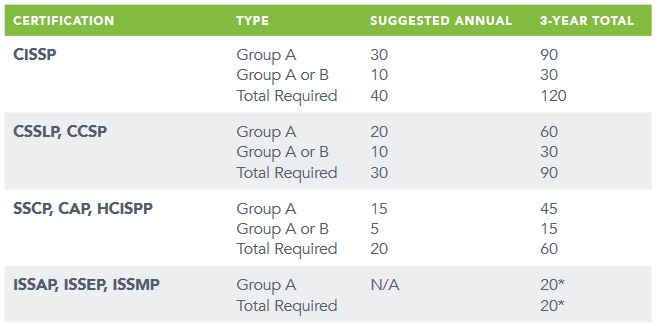ISC2 is one of the most reputable cyber security and IT security organizations in the world. ISC2 offers several cyber security and IT security certifications for professionals. Obtaining an ISC2 certification is tough but it is not over once you get the certification. You must be aware of ISC2 CPE requirements and how to retain your ISC2 certification. For instance, if you have ISC2 CISSP certification, you must follow the requirements and earn CPEs to maintain your CISSP certification. In this post, we have outlined the ISC2 CPE rules and how to renew ISC CISSP certification, which is the most reputable certification of ISC2.
ISC2 CPE Guidelines
Before diving into details of how you can earn ISC2 CPE credits, it is better to know ISC2 CPE guidelines and how you can renew an ISC2 certification. Once you have obtained an ISC2 certification, there are certain ISC2 recertification rules. There are three fundamental points of ISC2 CPE guidelines. These are:
- Abide by the ISC2 Code of Ethics
- Earning ISC2 CPE (Continuing Professional Education) Credits
- Paying the annual ISC2 membership fee.
The first point is about the common ethics and social responsibility of being a cyber security and IT security professional. ISC2’s code of ethics has a detailed list and details of principles. You can read the full ISC2 code of ethics if you searched on the web. The main point of abiding ISC2 code of ethics includes protecting society and ensuring trust and confidence. Besides, acting honorably, honestly, responsibly, and legally.
Note that, if you act against the ISC2 code of ethics, the ethics committee may decide to cancel your active ISC2 certifications. Moreover, you might not re-apply for the ISC2 certifications in the future as well. Therefore, abiding by this code of ethics is important.
Now, we will go over the other two points of ISC2 CPE guidelines.
ISC2 CPE Credits
Once you earned an ISC2 certification, you must renew it every three years. ISC2 proposes that a cyber-security professional or IT security professional must keep himself or herself up to date according to the changing dynamics of the world. To do this, professionals must continue their professional education.
There are certain rules while earning ISC2 CPE credits. ISC2 classifies CPE credits into two groups.
- Group A: Domain-Related Activities
- Group B: Professional Development Knowledge Sharing
Our 60 CPE Course bundle contains three courses and each of these courses will provide 20 CPE credits after completion. You can enroll in this bundle to earn 60 CPE credits online and look for other sources to complete the remaining 60 CPE credits.
ISC2 expects a certified professional to earn a certain number of CPE credits from these two CPE credit groups. Each ISC2 certification requires a different number of CPE credits from each group. The following table depicts the CPE requirements of each ISC2 certification respectively.

If you have one of the ISC2 certifications, you must earn ISC2 CPE credits based on these CPE requirements to renew your ISC2 certification every three-year period. Note that, similar guidelines are valid for ISACA CPE Requirements as well.
How to Earn CPE Credits
There are several ways to earn CPEs for renewing your ISC2 certifications. We have listed the alternative options to earn group A and group B CPE credits below.
Group A CPE credits include:
- Reading a magazine, book, or whitepaper.
- Publishing a book, whitepaper, or article.
- Attending a conference, educational course, seminar, or presentation.
- Preparing for a presentation or teaching information related to information security.
- Performing a unique work-related project that is not a part of your normal work duties.
- Self-study related to research for a project or preparing for a certification examination.
- Volunteering for government, public sector, and other charitable organizations.
- Taking a higher academic course.
- Attending a conference, educational course, seminar, or presentation.
- Preparing for a presentation or teaching information related to professional development.
- Self-study related to research for a project or preparing for a certification examination.
- Taking a higher academic course
Check our CPE Training Video
Typically, a one-hour activity counts for one CPE credit when renewing your ISC2 certification. For instance, if you have attended a cyber-security event with the following timetable, you can report three CPE credits in total.
- 9:00-10:00 – Session #1 –> 1 CPE credit
- 10:00-10:10 – Break
- 10:10-11:10 – Session #2 –> 1 CPE credit
- 11:10-11:20 – Break
- 11:20-12:20 – Session #3 –> 1 CPE credit
After earning ISC2 CPE credits, you must submit them under your profile on the ISC2 website. After ISC2 reviews your submitted CPE credits, if they are aligned with the CPE requirements of ISC2, they will be approved and you will be able to renew your ISC2 certification at the end of the three-year period.
ISC2 Membership Fee
While you are completing ISC2 CPE credits to renew your ISC2 certification, you must be paying the annual ISC2 membership fee (AMF) as well. ISC membership fee is $85 each year. Therefore, you will pay $255 in total for the three-year ISC2 certification renewal period. Then, you will be able to renew your ISC2 certification.
CISSP CPE Requirements
CISSP is the most reputable certification of ISC2. If you have CISSP certification, you must earn 40 CISSP CPE credits each year and 120 CPEs credits in total for a three-year renewal period. The following table shows the CISSP CPE requirements in detail.

As you can see from the table, you must earn at least 90 CISSP CPE credits from the group A CPE credits category. For the remaining 30 CPE credits, you can either earn from group A or group B. While attending CISSP CPE activities to earn CPE credits, make sure your CPE credits will align with these CISSP CPE requirements.
CISSP CPE Credits
All categories and sources we have listed above for earning ISC2 CPE credits are valid for CISSP CPE credits as well. Keep in mind that, typically, one-hour activity counts for one CISSP CPE credit hour. Following are sources for earning CISSP CPE credits:
- Reading: you can read an IT security or cybersecurity-related book, article, or blog. One-hour reading will bring you one CISSP CPE credit.
- Publishing: You can author a book, article, or post on a blog. Contributing to the cyber-security and IT security world as an author will bring CISSP credits to you respectively.
- Attending a Cyber Security or IT Security Event: You can attend conferences, training, seminar, presentation, or similar activity. These activities will help you to earn CISSP CPE credits.
- Presenting or Teaching: You can prepare for a cyber security event and present your knowledge or experience to other professionals or you can teach other professionals. These will bring CISSP CPE credits to renew your ISC2 certification as well.
- Performing a Unique Work-Related Project: As a cyber-security or IT security professional, you might be working in a full-time position. You might participate in a project in your work that is not a part of your normal work duties. This will bring CISSP CPE credits as well.
- Self-study: You might be doing research for a project or preparing for other cyber security or IT security certification exams. Hours you spend on your research or certification preparation will count for CISSP CPE credits as well.
- Volunteering: You can volunteer for government, public sector, and other charitable organizations to help them stay secure in the IT world. For instance, you can do a vulnerability analysis for a non-profit charity organization’s website and this will help you to earn CISSP CPE credits respectively.
- Taking a higher academic course: Attending a master’s class or similar education program will bring CISSP CPE credits.
As you can see, there are several ways of earning CISSP CPE credits. However, if you are a full-time working professional, attending a seminar, conference or project will be tough for you. Because you must make sure that the schedule of the activity will fit your schedule. Besides, you have to pay a significant amount of money to attend the activity. However, CISSP CPE credits online resources are more affordable and convenient to attend.
CISSP CPE Credits Online
Our 60 CPE Course bundle contains three courses and each of these courses will provide 20 CPE credits after completion. You can enroll in this bundle to earn 60 CPE credits online and look for other sources to complete the remaining 60 CPE credits.
CISSP CPE Training
One of the most common ways of earning CPE credits is attending a CISSP CPE training. In order to complete the 120 credits requirement in each three-year period, you must attend 120 hours of CISSP CPE training in total. This makes at least 15 days of CISSP CPE training in total.
It is almost impossible to find a 15-day CISSP CPE Training activity to complete your CISSP renewal period. However, you can find four or five-day cyber security or IT security CISSP CPE training alternatives each year. In this way, at the end of the third year, you will complete the 120 CPE credits for CISSP renewal.
CISSP Renewal
Let us make a recap here. For CISSP renewal, which is actually an ISC2 certification renewal, you must comply with three fundamental points. First, you must adhere to the code of ethics. Second, you must earn 120 CISSP CPE credits in each three-year period and 40 CPE credits in each year for renewal. Third and the last, once you completed the 120 CPEs credit for CISSP renewal, you must have paid the annual ISC2 membership fee, which is $85 per year.
If you satisfy all these conditions, you will be able to renew your CISSP certification without any hassle. If you are a working professional and time is a problem for you, we recommend CISSP CPE credits online resources to complete your CISSP CPE needs and renew your certification.


